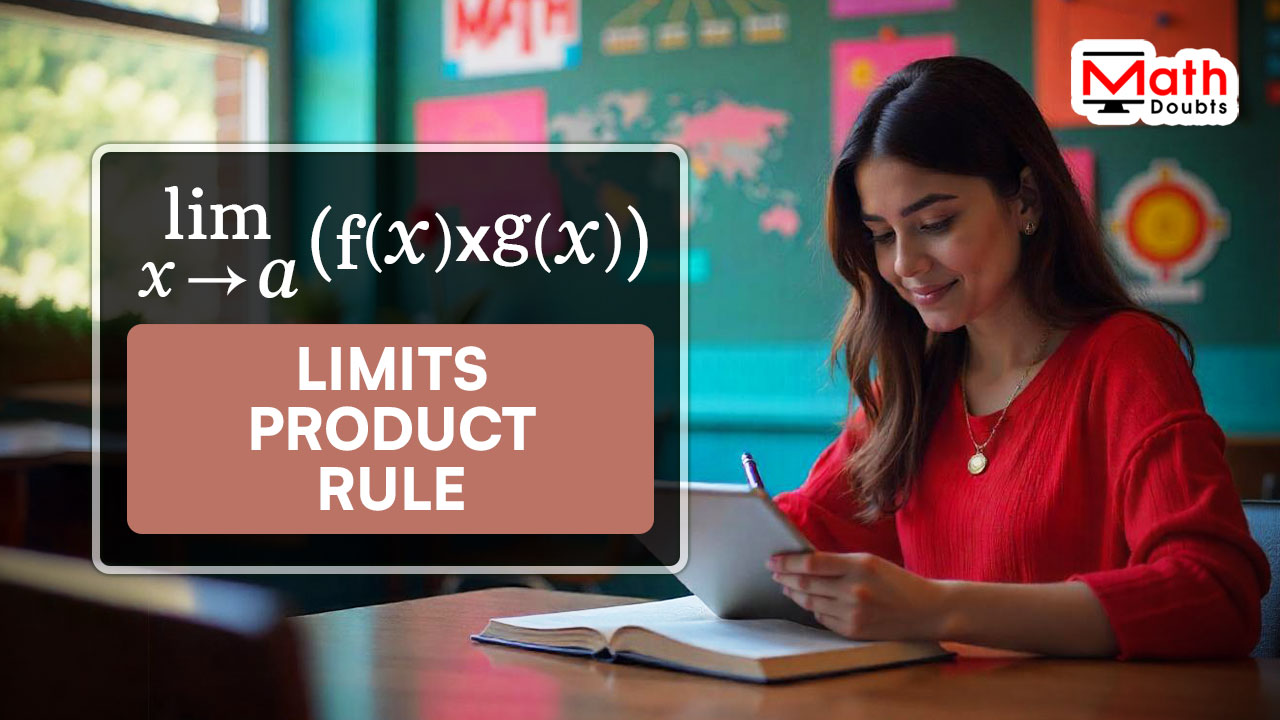Multiplication of Limits Rule
Formula
$\displaystyle \large \lim_{x \,\to\, a}{\normalsize \big[f{(x)} \times g{(x)}\big]}$ $\,=\,$ $\displaystyle \large \lim_{x \,\to\, a}{\normalsize f{(x)}}$ $ \times $ $\displaystyle \large \lim_{x \,\to\, a}{\normalsize g{(x)}}$
Introduction
An expression can be formed by multiplication of two or more functions and their product may interrupt the procedure of finding the limit. So, a limit formula is essential for us to evaluate the limit of product of functions and it is called the multiplication of limits rule. It is also called the product of limits rule.

Let’s assume $f(x)$ and $g(x)$ denote two functions in $x$. The multiplication of $f(x)$ and $g(x)$ is written as $f(x) \times g(x)$ and their product is written as $f(x).g(x)$ simply in mathematics. The limit of multiplication of functions $f(x)$ and $g(x)$ as the value of variable $x$ approaches a value $a$ is written as follows.
$\displaystyle \large \lim_{x \,\to\, a}{\normalsize \big[f{(x)} \times g{(x)}\big]}$
According to product law of limits in calculus, the limit of a product is equal to the product of their limits. So, the limit of product of functions $f(x)$ and $g(x)$ is equal to product of the limits of $f(x)$ and $g(x)$ as $x$ tends to $a$.
$\displaystyle \large \lim_{x \,\to\, a} \normalsize \Big(f{(x)} \times g{(x)}\Big)$ $\,=\,$ $\displaystyle \large \lim_{x \,\to\, a}{\normalsize f{(x)}}$ $ \times $ $\displaystyle \large \lim_{x \,\to\, a}{\normalsize g{(x)}}$
It is an equation that expresses the product of limits theorem and it can be used as a formula in calculus.
Examples
Let’s understand the limit product rule from an easy limit problem.
Evaluate $\displaystyle \large \lim_{x \,\to\, 2}{\normalsize x^2(x+3)}$
Let’s try the direct substitution method to evaluate the limit of multiplying functions.
$\implies$ $\displaystyle \large \lim_{x \,\to\, 2}{\normalsize x^2 \times (x+3)}$ $\,=\,$ $2^2 \times (2+3)$
$\,\,=\,$ $2 \times 2 \times (5)$
$\,\,=\,$ $4 \times 5$
$\,\,=\,$ $20$
Now, let’s find the limit of every function in the expression by direct substitution.
$(1).\,\,$ $\displaystyle \large \lim_{x \,\to\, 2}{\normalsize x^2}$ $\,=\,$ $2^2$ $\,=\,$ $4$
$(2).\,\,$ $\displaystyle \large \lim_{x \,\to\, 2}{\normalsize (x+3)}$ $\,=\,$ $2+3$ $\,=\,$ $5$
Multiply the limits of both functions to find their product mathematically.
$\implies$ $\displaystyle \large \lim_{x \,\to\, 2}{\normalsize x^2}$ $ \times $ $\displaystyle \large \lim_{x \,\to\, 2}{\normalsize (x+3)}$ $\,=\,$ $4 \times 5$ $\,=\,$ $20$
It is proved that the limit of sum of the functions is equal to the sum of their limits.
$\,\,\,\,\,\,\therefore\,\,\,$ $\displaystyle \large \lim_{x \,\to\, 2}{\normalsize x^2 \times (x+3)}$ $\,=\,$ $\displaystyle \large \lim_{x \,\to\, 2}{\normalsize x^2}$ $ \times $ $\displaystyle \large \lim_{x \,\to\, 2}{\normalsize (x+3)}$ $\,=\,$ $4 \times 5$ $\,=\,$ $20$
Now, let’s learn much more about the limit of a product law.
Extension
The multiplication rule for limits is not limited to two functions. It can be extended to more than two functions and the limit of a product rule can be written as follows.
$\displaystyle \large \lim_{x \,\to\, a} \normalsize \Big[f_{1}{(x)} \times f_{2}{(x)} \times f_{3}{(x)} \times \cdots\Big]$ $\,=\,$ $\displaystyle \large \lim_{x \,\to\, a}{\normalsize f_{1}{(x)}}$ $ \times $ $\displaystyle \large \lim_{x \,\to\, a}{\normalsize f_{2}{(x)}}$ $ \times $ $\displaystyle \large \lim_{x \,\to\, a}{\normalsize f_{3}{(x)}}$ $ \times $ $\cdots$
$\displaystyle \large \lim_{x \,\to\, a} \normalsize \big[f{(x)} \times g{(x)}\big]$
The limit of product formula’s proof to learn how to prove the limit of a product of functions is equal to product of their limits.
